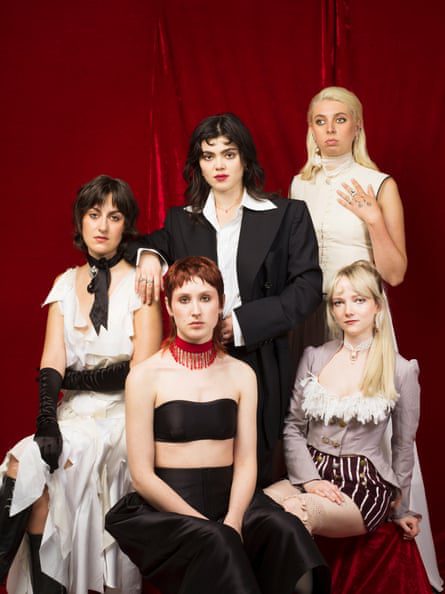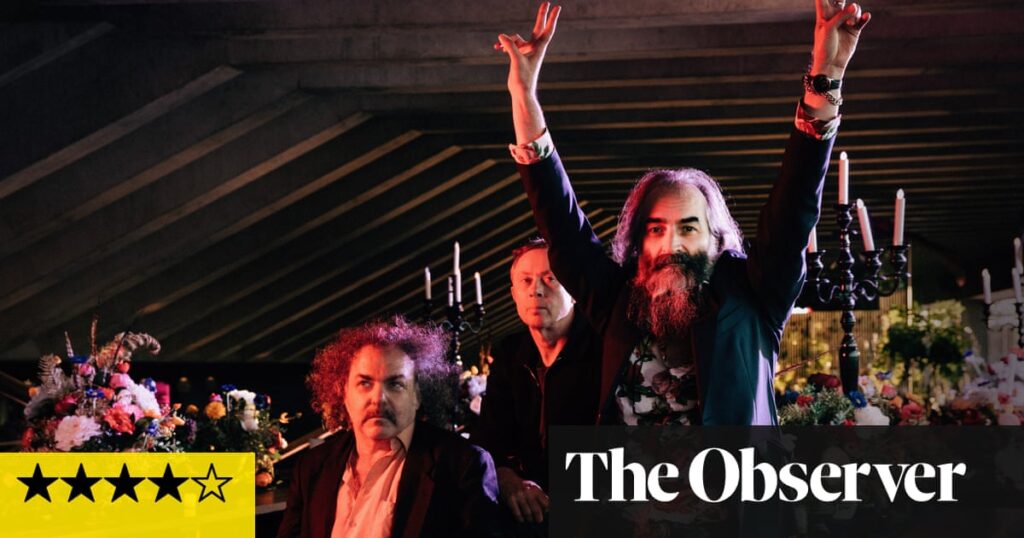
The Last Dinner Party on misogyny, maximalism and making it big: ‘Men think they’re the arbiters of rock’
The annual scramble for Glastonbury tickets is a rite of passage – and Georgia Davies is used to disappointment. “I’d been trying to get tickets for years,” she says. “It never worked.” But last year, she and her friends found a workaround. “The trick is to play it,” she says with a grin.
Davies plays bass in Britain’s most talked-about young band, the Last Dinner Party (TLDP). The baroque-pop five-piece have had a staggering rise since forming in the pandemic, fuelled by their maximalist, nihilistic debut single, Nothing Matters, released in April 2023. Two months later, they played Glastonbury’s Woodsies stage, clocking off just after noon to enjoy the rest of the festival. It was “the best feeling ever”, says the rhythm guitarist, Lizzie Mayland: the thrill of performing, plus the freedom of being a punter.
“I don’t think anyone recognised us,” says the frontwoman, Abigail Morris. They expect this year to be different.
In January, TLDP won the BBC’s Sound of 2024 poll and Nothing Matters broke the UK Top 20. A month later, they shot to No 1 with a critically acclaimed debut album, Prelude to Ecstasy, and took home the Brit award for Rising Star. At Glastonbury this weekend, they are performing on the Other stage on Saturday afternoon, teeing up Bloc Party, the Streets and Disclosure. TLDP can no longer be described as up-and-comers.
“We’re comers,” Morris jumps in, to laughter all round. “That’s the pull quote – ‘TLDP: We’ve come.’”
Still in their finery from their Guardian photoshoot, the group, aged between 24 and 27, are constantly teasing – each other, themselves, me. Our interview gets so raucous sometimes that I later struggle to make sense of the tape. They are wise-cracking and whip-smart, but also visibly dazed by their success, with an undercurrent of trepidation coalescing around not just their Glastonbury set, but where they go from here. “I was saying to my mum the other day: this is what I’ve wanted my whole life and, all of a sudden, I’ve got it – what do I do now?” says Roberts, to general accord.
They played their first gig at the George Tavern in London in November 2021; the door charge was £5.50. A breakthrough came when footage of their February 2022 show at Venue MOT in London was posted on YouTube. Sydney‑born Davies recalls the avalanche in their inbox: “It was hectic: record labels, managers, lawyers, agents, magazines … It felt like another full-time job, to stay on top of that.”
This was the sort of attention they had hoped to achieve in a few years’ time, “maybe”, Davies emphasises. “We had no help, at that point, to tell us what was a good thing.”
They found a manager within two months. Nothing Matters was released a whole year later. It was important for them to take their time, says Davies. “You hear horror stories about people jumping into exploitative record deals where they don’t own their masters ever. We were like: let’s walk before we can run.” But, bar a tweak to their name (they were originally “the Dinner Party”), TLDP emerged unusually fully formed.
Morris, Davies and Mayland met while studying at King’s College London, while Emily Roberts and Aurora Nishevci were at the Guildhall School of Music and Drama. In 2019, well before the two parts came together, Morris and Davies wrote a “manifesto” for their future band while on a pub crawl, detailing their vision down to colours (emerald, burgundy, cream) and fabrics (velvet, obviously); the top of the scrap of lined paper read “decadence”.
From the beginning, the music and aesthetics “came hand in hand”, says Morris. Regular gig-goers themselves, they aspired to generate a sense of occasion and community. “Being in a room of people jumping around, having a great time – that’s what we wanted to create,” says Mayland.
Although they were rehearsing throughout 2021, they didn’t pursue gigs until pandemic restrictions had been lifted fully. “We didn’t want people to be sitting down,” says Morris. “From the beginning, we were taking it so seriously.” They even staged a photoshoot to launch their Instagram account, styling themselves and roping in friends to dress the set and photograph them. Ironically, those images were later held up as evidence that the band was cynically assembled by Island Records, the label to which they had signed. “‘Their first shoot clearly shows loads of money; they’re obviously industry plants,’” Morris laughs, recalling one comment. “But we did that all ourselves.”
The charge dogged TLDP through their early press. I’m not sure myself what an “industry plant” actually is, I admit. “I don’t think anyone is,” says Davies. “There’s no definition. It’s typically just young women who are successful.”
The criticism conflates investment with inauthenticity, she complains. “The Beatles were industry plants. If that’s your definition – ‘the industry helps you’ – then every single artist who’s been aligned with a record label is the same.” I recall Lorde and Billie Eilish – both teenagers when their music was discovered – being tarred with that brush. “Hmm!” Morris cuts in, with her formidable comic timing. “I’m noticing a trend!”
More recently, the criticism has given way to acclaim. Prelude to Ecstasy became the bestselling British debut album by a band since Years and Years’ Communion, in 2015, and received rave reviews. That itself has been “disturbing”, says Morris: “The impostor syndrome sets in – and the confusion.” She doesn’t want to come across as churlish, or disrespectful of fans, she adds. But “when you’re told one thing over and over, it loses the significance and sincerity”.
How has the band learned to protect themselves? “TBD [to be determined],” quips Nishevci, to raucous laughter and rapid‑fire suggestions. “Therapy,” says Roberts in an undertone. “Stop reading comments,” says Mayland. “Stop reading interviews,” adds Morris. Davies: “Just log the fuck out.” They now post to social media via an intermediary, having last year made headlines with their rebuke of some male fans on Twitter: “We see the weird shit you post about us and are highly unimpressed! Have some fucking decorum.” (Davies claims authorship.)

Although squarely gen Z themselves, playing to “screaming women”, as Morris proudly describes their recent crowds, TLDP’s classic rock influences and heavy airplay by 6 Music meant they were embraced, early on, by an older male audience. There is a strand of paternalism to the Darkness frontman Justin Hawkins’ approval of Roberts’s “proper guitar solos”, while interviewers emphasise their youth and style.
“It’s always the tone of surprise with men: ‘You impress me – well done,’” agrees Morris. “It’s a strange kind of avuncular gatekeeping, like they’re the ones who are the arbiters of rock music: ‘Have you heard of the Slits?’” Early on, Davies says, they were treated “like we were the first women to have picked up guitars” – erasing their influences and their individuality (Mayland is non-binary).
They are excited by the possibility of pushing open those rusting gates. At Latitude festival last year, the band was set upon by two small boys who wanted their guitar picks. They had always hoped to inspire young girls, says Morris; now, they are dreaming of helping the next generation of men to be “not afraid of women, or intimated, or angry … It was so wonderful to see young boys, pre‑tarnished by patriarchy, not looking at us in any way other than with awe and respect.”
Part of the enthusiasm for TLDP stems from excitement that they are bringing rock back. But while reviewers compare them to David Bowie, Queen and Sparks, theacts they themselves namecheck most often are Chappell Roan and Lana Del Rey (both also once tarred as industry plants). Their decadent style has been framed as a backlash to our grim times, “but we’re so not opposed to being dour and emotional”, says Morris. “It’s just different ways of coping with how fucked the world is.”

While TLDP have been subjected to snark for their perceived poshness (Morris was privately educated), they are highly aware that their lightning-in-a-bottle success is far from the norm. “It is becoming impossible for artists from working-class and other marginalised backgrounds to become heard,” Davies said in March.
That pressure and anxiety filtered through even to their rarefied institutions. At Guildhall, Nishevci says, students were expected to be able to compose, produce and “play a billion instruments”, all by themselves. Roberts – who left a successful gig as a session guitarist for Six, the Henry VIII musical, to pursue TLDP – recalls practising her instrument for five or six hours a day. “My teachers made me feel so bad for not doing enough, when I was doing as much as I could.” Now, Roberts says guiltily, “I haven’t practised in two years”. (“I can tell,” jokes Morris.)
Are they conscious of overexposure? Unanimously: “YES.” They asked their label to take down sponsored posts for the band on Instagram, conscious of them being a lightning rod for criticism. “Your exposure to the world affects your day-to-day life,” Nishevci says. But Mayland recalls the advice given to them by Florence Welch, to whom they are often compared: “She said to trust ourselves – the five of us: ‘Your taste is the only reason anyone’s here.’” The strength they take from each other is plain to see; you wonder how solo artists of similar ages and status cope.
Despite their packed schedule, TLDP started writing their second album over a two-week session early in May. “I think I can speak for everyone: it was the happiest we’ve been in a really long time,” says Morris. The “silver lining” of their rapid rise is that songwriting, in particular, is still exciting, agrees Mayland: “It feels like we’re doing something new.” Morris is conscious of resisting the “sophomore trap” of striving either to top their first album or reinvent themselves. “If we change, it’s going to be because we want to … a natural, gentle evolution as we go through our 20s.”
Whether the industry will allow them that remains to be seen. For the moment, the band agree: they are on a treadmill. The week after Glastonbury, TLDP are playing three festivals, then jetting off to Australia, Japan and the US, finally rounding out the year with a tour of the UK and Europe. As much as they joke about winning a Grammy, or else being “broody” and skipping straight to motherhood, their only ambition is to hold on for dear life – and to have fun doing it.
Morris points out that their earliest aspiration as a band was to play the Windmill, a tiny, scuzzy music pub in Brixton. “It was such a holy grail, a beacon, when we moved to London – and then it was our second show.” She throws up her hands in mock defeat. “It was like: ‘Well, we’ve done it. Nowhere up from here!’” You can tell that no part of her believes it. After all, there is always the Pyramid stage.




